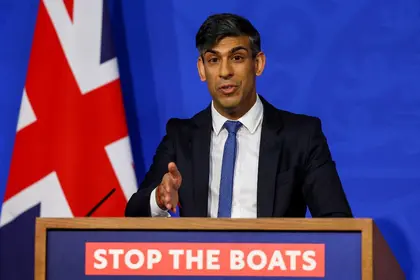UK leader Rishi Sunak travels to Warsaw on Tuesday for talks with Polish premier Donald Tusk and Nato chief Jens Stoltenberg that will focus on Ukraine and wider European security.
While in Poland's capital, the British prime minister will announce £500 million ($617 million) in additional military funding for Kyiv in its more-than two-year battle against Russia's full-scale invasion, his Downing Street office said in a statement.
JOIN US ON TELEGRAM
Follow our coverage of the war on the @Kyivpost_official.
"Defending Ukraine against Russia's brutal ambitions is vital for our security and for all of Europe. If Putin is allowed to succeed in this war of aggression, he will not stop at the Polish border," Sunak said ahead of the trip.
His visit to Eastern Europe comes as Kyiv pleads with allies to ramp up supplies of ammunition and air defences desperately needed to repel Russian attacks.
It also takes place as Western countries come under pressure to boost spending on their own defence in the face of Russian threats.
Ukraine has for months struggled with a growing shortage of ammunition, with Europe struggling to provide weaponry as Ukrainian forces get pushed back along the front line.
US lawmakers eased the pressure last weekend by unblocking a $61-billion military aid package for Kyiv following six months of political wrangling.
But EU defence and foreign ministers insist that Europe must still speed up its deliveries of arms to Ukraine.
Germany has answered Kyiv's call in recent days by saying it would send an extra Patriot air defence system to Ukraine.

EU Transfers €1.5 Bln Raised From Russian Assets for Ukraine
Stoltenberg said last week that he expected more NATO countries to make announcements on fresh air defences for Kyiv "soon".
During his trip, Sunak will announce the UK's "largest-ever single package of equipment" for Ukraine's war effort.
It will include more than 1,600 strike and air defence missiles, as well as additional Storm Shadow long-range precision-guided missiles.
He will also pledge more than 400 vehicles, including armoured ones, and nearly four million rounds of small arms ammunition.
- Sky Shield -
Ukraine has asked especially for seven more advanced Patriot systems capable of shooting down Russia's hypersonic missiles -- but is keen to get any help it can.
Six nations in the EU -- Germany, Greece, the Netherlands, Poland, Romania and Spain -- have the US-designed systems.
Sunak will then travel to Germany where he will meet Chancellor Olaf Scholz in Berlin on Wednesday.
The German government has led a push to bolster NATO's air defences in Europe amid Russia's relentless missile strikes on Ukraine.
Berlin has urged allies to buy deterrence systems together and the UK is among some 20 countries to have signed up to Germany's common air defence project, the European Sky Shield Initiative.
The project would involve joint procurement for short-, medium- and long-range systems, including the German-made Iris-T, the American Patriot system and the US-Israeli Arrow 3.
France has so far declined to sign up to the pact, with officials there arguing instead for an air defence system using European equipment.
Tusk only announced last week that Poland -- which has seen Russian missiles enter its airspace -- intended to join.
EU chief Ursula von der Leyen recently warned EU leaders to boost defence spending.
Brussels has put forward a 1.5-billion-euro ($1.6-billion) strategy to step up defence production, but officials say this is nowhere near sufficient.
Sunak is under pressure to raise defence spending in Britain, which left the EU in early 2020, to three percent of GDP, as a general election looms later this year.
You can also highlight the text and press Ctrl + Enter






